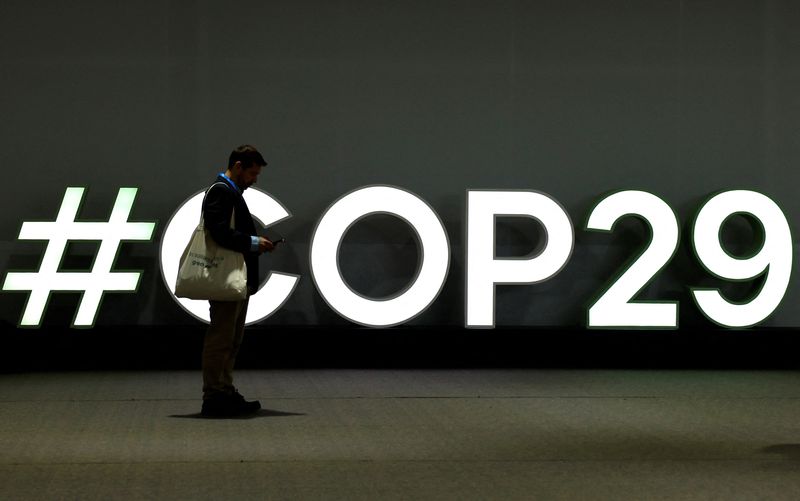By Kate Abnett, Nailia Bagirova and Karin Strohecker
BAKU (Reuters) – Countries at the COP29 climate summit were warned on Wednesday that the “hardest part” was about to begin in talks over how much money should be provided to developing countries to help them cope with the climate change.
Figuring out what form that financing takes, who pays and how much, is the main task of this year’s annual UN climate talks. With a notional Friday deadline looming, frustration over the lack of progress began to seep out of the negotiating rooms.
Yalchin Rafiyev, the chief negotiator of summit host Azerbaijan, said “now the most difficult part begins”, ahead of a new text due at midnight (2000 GMT) in the capital Baku.
Progress at the annual summit is usually marked through regular draft documents that are reduced to a final agreement.
Rich and developing countries are sharply divided over the size of the new target. It will replace a 2020 pledge by developed countries – made two years late – to provide $100 billion a year in climate finance.
Uganda’s Adonia Ayebare, chair of the G77 and China group of more than 130 developing countries, said his demand was for rich countries to provide $1.3 trillion in public climate finance annually.
“The frustration is that the other party has not made us a counter-offer,” Ayebare told Reuters.
“We hear $300 billion. But if that’s true, that’s really not acceptable. It’s shameful,” he said.
Another negotiator from developing countries told Reuters that the European Union had released $200 billion to $300 billion in informal talks. But on Wednesday the EU insisted it had no official position on the number.
EU Climate Commissioner Wopke Hoekstra said the bloc did not want to talk about the figure until it had more structural details, adding: “Otherwise you have a shopping basket with a price, but you don’t know exactly what’s in it.”
Countries still disagree over whether large, still-developing economies – including the world’s second-largest economy, China – will contribute to achieving this goal.
Egypt’s Environment Minister Yasmine Fouad said countries had agreed that better-off developing countries would not be legally obliged to help pay.
Azerbaijan’s Rafiyev said the COP29 presidency would come up with a tighter text overnight. Simply put, a 25-page document filled with multiple options for almost every paragraph should become a two-page document that can be refined in the final days and then adopted.
“We will have shorter, more concise and to-the-point texts,” Rafiyev said.
FOSSIL FUELS
While talks on finance have been slow, talks on accelerating efforts to reduce climate-damaging emissions are proving to be just as tough.
After striking a landmark deal to transition away from fossil fuels in Dubai last year, the countries have so far been unable to agree on language that would advance that work in Baku.
Austrian climate minister Leonore Gewessler told Reuters that the Arab group of countries led by Saudi Arabia had been “very vocal in watering down the mitigation part” of the negotiations.
A representative of Saudi Arabia’s delegation did not immediately respond to a request for comment.
Saudi Energy Minister Prince Abdulaziz bin Salman has previously described the Dubai deal as a menu of options – suggesting not all countries will choose quitting fossil fuels as their chosen path forward.
OPEC Secretary General Haitham Al Ghais used a speech at the summit to say they were a gift from God, echoing the words of Azerbaijani President Ilham Aliyev, whose opening speech appealed to Western critics of the industry.

Getting a new commitment to cut emissions faster has come in sharp contrast to the growing belief among scientists that the world’s ambitious goal of limiting global warming to 1.5 degrees Celsius could soon be out of reach can lie down.
If recent trends do not change, “we will exceed the 1.5 limit at the beginning of 2030 or even slightly earlier,” said French climatologist Robert Vautard.


